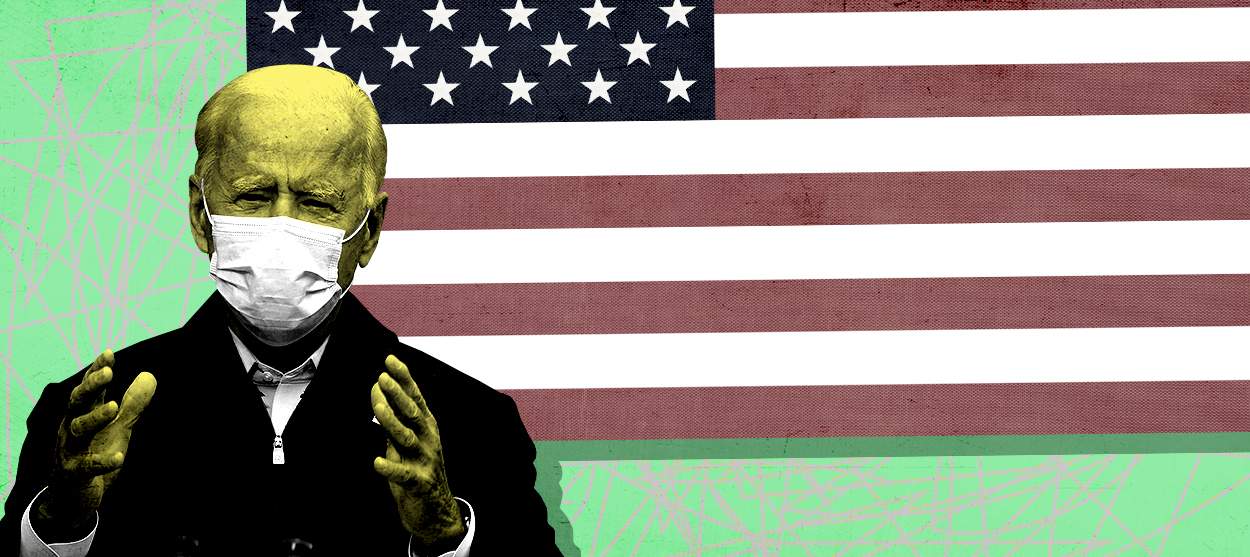3 ways Biden's COVID-19 task force can control the pandemic
It's not too late to save thousands of lives


A free daily email with the biggest news stories of the day – and the best features from TheWeek.com
You are now subscribed
Your newsletter sign-up was successful
This fall, some critics accused scientists, public health experts, and physicians (like myself) of having become too political during the COVID-19 pandemic. It was cynically predicted that after November 3rd, both frontline health-care providers and academic researchers would suddenly change their tune, and act as though the coronavirus had vanished. The implication was that the experts were weaponizing the greatest health crisis of the century against the sitting president, rather than advocating for the safety of our fellow humans.
Far from it. Once it became clear that Joe Biden would be the next president of the United States, many of my colleagues who care deeply about controlling the pandemic began clamoring to get involved, myself included. We all sensed that with this incoming administration, there exists an opportunity to do a ton of work, and that the work would be meaningful and impactful. While I knew I had a vanishingly low likelihood of being named to Biden's new "Transition COVID-19 Advisory Board," I was pleased to see so many names of colleagues whose work I already respect and, in a few cases, those who I know directly. My sense from communicating with three of the appointed members this week is that they anticipate a robust conversation with experts in the medical and scientific community, and that the board is seeking ideas from the best and brightest in all of the relevant fields.
But what can this new advisory board — which we assume will seamlessly replace the existing White House Coronavirus Taskforce — achieve now and in the future? Can a committee really accomplish anything in the face of this deadly and rampant illness? There is reason for optimism.
The Week
Escape your echo chamber. Get the facts behind the news, plus analysis from multiple perspectives.

Sign up for The Week's Free Newsletters
From our morning news briefing to a weekly Good News Newsletter, get the best of The Week delivered directly to your inbox.
From our morning news briefing to a weekly Good News Newsletter, get the best of The Week delivered directly to your inbox.
While it may seem that the pandemic is out of control in America — and indeed, it is — it's not too late to save tens if not hundreds of thousands of lives. Currently, we are averaging over 100,000 new coronavirus cases per day in the United States. But even if the number of new cases were 500,000 per day, it would take nearly two years for every American to become infected. Yes, President Trump's feckless inaction, and also incompetence of officials at the state and local level, is costing many lives today. But there will still be hundreds of millions of people left to protect, even if nothing changes between now and Biden's inauguration.
The first thing the advisory board will undoubtedly achieve is to adhere to rule numero uno of medicine and science: Do no harm. This may seem like a low bar, but Trump's current task force has done a lot of damage — from the debacle around its failed attempt to acquire a large number of coronavirus tests to its more recent embracing of a nonsensical herd immunity strategy — which experts have spent countless hours trying to undo. Its now-retired briefings — ostensibly led by Vice President Mike Pence, but actually led by the whims of whichever sycophant Trump last texted — were a constant source of misinformation and confusion for the nation. Fortunately, the first stated principle on the Biden-Harris transition website is to "listen to science." Refreshing!
From there, the new advisory board's stated mandate is: "to determine the public health and economic steps necessary to get the virus under control, to deliver immediate relief to working families, to address ongoing racial and ethnic disparities, and to reopen our schools and businesses safely and effectively." Broadly speaking, the board will influence policy by influencing the president. In turn, the president can guide the federal government's response options relying chiefly on three levers of power.
The first is executive action: using either usual presidential powers or those granted by the national state of emergency. For example, the president can use the Defense Production Act to direct American companies to increase production of COVID-19 tests and personal protective equipment like masks and eye coverings. Trump has used the DPA some. Biden is expected to use it more. While these mandates come with limited funding, they can be effective. The DPA can be used to require that companies set side resources so that forthcoming anticipated orders can be quickly fulfilled. If the Pfizer vaccine ends up being as effective as currently hoped, for example, a large quantity of dry ice will be needed to keep the lots at –80°C temperatures during transport and on-sight storage. The DPA can direct companies to take (or avoid) actions that would create bottlenecks in any declared national priorities, such as vaccine distribution. The DPA even allows exceptions to monopoly/anti-trust laws. The taskforce's job, then, will be to help the Biden-Harris team identify the right priorities, based on its ongoing assessment of current and foreseen needs.
A free daily email with the biggest news stories of the day – and the best features from TheWeek.com
The second way that the White House can affect the pandemic response is to announce priorities to the Cabinet and to federal agencies. If Biden directs FEMA to roll out more testing facilities, they will do so. If the president directs the Army National Guard to construct field hospitals, they will do so — and quickly. The White House can urge the Department of Health and Human Services and the Food and Drug Administration to be more rigorous in adjudicating emergency use authorization applications for potential therapies to treat COVID-19. That way, the public will have faith in the medicines being offered, and have more realistic expectations about those that are not.
Lastly, Biden can shape any action from Congress by indicating policies he will or won't support. When another round of aid becomes available via another iteration of the CARES Act, that legislation will likely reflect priorities announced by the White House. For example, if it is determined that indoor dining is too dangerous in some hotzones, the CARES Act could stipulate that those who lose their jobs due to related closures would receive additional benefits. Or, the CARES Act might stipulate that medical care stemming from chronic complications of COVID-19 be guaranteed to be affordably covered by health insurance plans, which is currently not the case, even with the Affordable Care Act in place.
Biden's new coronavirus advisory board (and the future White House Coronavirus Taskforce) stands to wield tremendous influence. Its assessment of what and where the major problems are and how best to address them have the potential to become executive orders, to shape government agency priorities leading to immediate action, and to outline stipulations in forthcoming congressional legislation. Their recommendations stand to carry considerable weight.
Under normal circumstances, at least some of this influence might be felt immediately; most outgoing administrations honor the stated priorities of the incoming one so that the work of the nation can be carried out during the twilight of one administration and the dawn of the next. Whether President Trump decides to allow the work of President-elect Biden's already up-and-running COVID-19 advisory board to replace the mayhem and incompetence of the current White House Coronavirus Taskforce tomorrow or in a month could literally cost or save many American lives.
Want more essential commentary and analysis like this delivered straight to your inbox? Sign up for The Week's "Today's best articles" newsletter here.
Brief19 editor-in-chief, Dr. Jeremy Samuel Faust MD MS, is a proud emergency physician at Brigham and Women's Hospital in the division of health policy and public health, and an instructor at Harvard Medical School. His writing has appeared in The New York Times, The Washington Post, The Boston Globe, The Atlantic, Scientific American, and appears frequently in Slate. He has appeared on CNN, CNBC, MSNBC, NBC, FOX, ABC's 20/20, NPR, and others.
-
 How the FCC’s ‘equal time’ rule works
How the FCC’s ‘equal time’ rule worksIn the Spotlight The law is at the heart of the Colbert-CBS conflict
-
 What is the endgame in the DHS shutdown?
What is the endgame in the DHS shutdown?Today’s Big Question Democrats want to rein in ICE’s immigration crackdown
-
 ‘Poor time management isn’t just an inconvenience’
‘Poor time management isn’t just an inconvenience’Instant Opinion Opinion, comment and editorials of the day
-
 The billionaires’ wealth tax: a catastrophe for California?
The billionaires’ wealth tax: a catastrophe for California?Talking Point Peter Thiel and Larry Page preparing to change state residency
-
 Bari Weiss’ ‘60 Minutes’ scandal is about more than one report
Bari Weiss’ ‘60 Minutes’ scandal is about more than one reportIN THE SPOTLIGHT By blocking an approved segment on a controversial prison holding US deportees in El Salvador, the editor-in-chief of CBS News has become the main story
-
 Has Zohran Mamdani shown the Democrats how to win again?
Has Zohran Mamdani shown the Democrats how to win again?Today’s Big Question New York City mayoral election touted as victory for left-wing populists but moderate centrist wins elsewhere present more complex path for Democratic Party
-
 Millions turn out for anti-Trump ‘No Kings’ rallies
Millions turn out for anti-Trump ‘No Kings’ ralliesSpeed Read An estimated 7 million people participated, 2 million more than at the first ‘No Kings’ protest in June
-
 Ghislaine Maxwell: angling for a Trump pardon
Ghislaine Maxwell: angling for a Trump pardonTalking Point Convicted sex trafficker's testimony could shed new light on president's links to Jeffrey Epstein
-
 The last words and final moments of 40 presidents
The last words and final moments of 40 presidentsThe Explainer Some are eloquent quotes worthy of the holders of the highest office in the nation, and others... aren't
-
 The JFK files: the truth at last?
The JFK files: the truth at last?In The Spotlight More than 64,000 previously classified documents relating the 1963 assassination of John F. Kennedy have been released by the Trump administration
-
 'Seriously, not literally': how should the world take Donald Trump?
'Seriously, not literally': how should the world take Donald Trump?Today's big question White House rhetoric and reality look likely to become increasingly blurred
